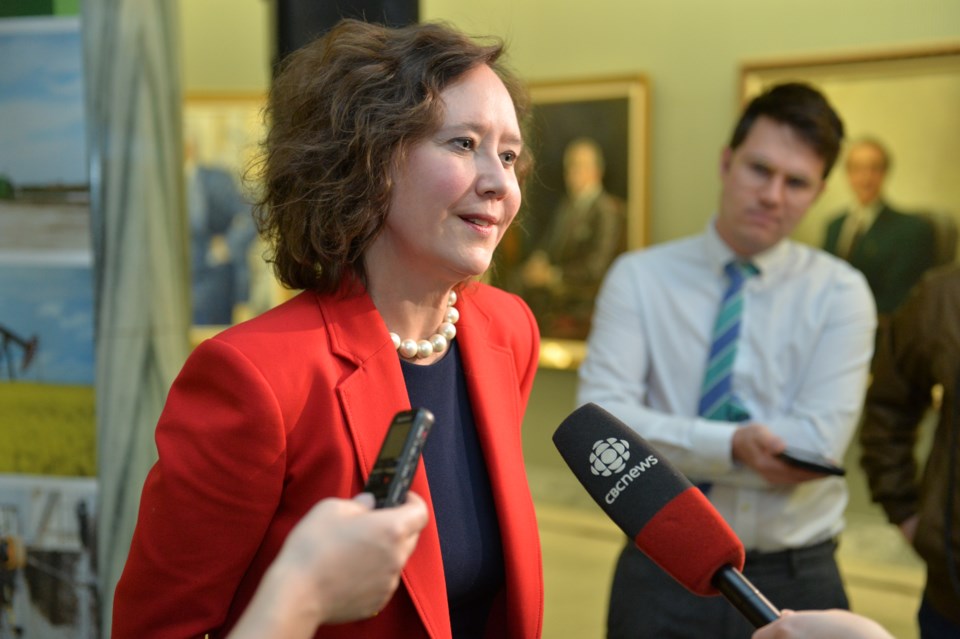Regina – The morning of Monday, March 9, the world woke up to one of the biggest oil shocks in decades. The price of crude oil, both West Texas Intermediate (WTI) and Brent, had dropped as much as US$13 when trading opened overnight before climbing back $5 or so by mid-afternoon. That left WTI floating around US$33 per barrel, and Western Canadian Select (WCS) around $22 at the time Saskatchewan Energy and Resource Minister Bronwyn Eyre happened to be hosting a press conference about well abandonments. (WCS closed at $15.73 that day)
“We all know the sector is facing a lot of challenges. We’re all hearing the news today,” Eyre said in her initial remarks.
Facing reporters, Eyre said, “Obviously, it’s a concern. We’ve all be monitoring and watching the news around that over the last 24 hours at any rate. It’s too early to tell, in terms of long-term impact.
“We hope that things correct. We’re seeing a bit of a multiplier effect in the markets and watching it with a bit of concern, but hope that it’s short term.
Asked what are the implications for the upcoming Saskatchewan budget, Eyre said, “My understanding is the numbers were finalized Feb. 28. Obviously, the budget’s coming out next week. The Minister of Finance, I’m sure, will have something to say in the next day or so, and certainly on budget day, but we’re going to wait for budget day, at this point, and hope that, in the meantime, this is a short-term thing and won’t impact long-term forecasts for the price of oil.”
In terms of the Ministry planning for the potential of a longer-term downturn, she replied, “It’s too early to tell, of course, in that we’re all monitoring this. And certainly the Ministry of Finance will be looking at this very carefully with our experts from the Ministry of Energy and Resources. Right now, the way the budget is set up, it’s based on forecasts fore the coming year, which is a relatively involved, not simple process. Again, numbers were finalized Feb. 28. We’ll see what comes out in the budget, in terms of estimates, going forward, but we do remain hopeful this is a short-termed phenomena.”
On Feb. 28, WTI was trading for US$44.72, and on Feb. 20, it was US$53.78 per barrel.
“The budget will go forward, as planned,” Eyre said.
The Saskatchewan government has moved away from its reliance on resource revenue in recent years, she noted. “The oil and gas sector still plays an important role in our GDP and is a very crucial sector for us, so, of course, it’s of significance when we see this happening today, but again, it’s too soon to tell. We’ll continue to monitor it.”
Alberta Premier Jason Kenney gave a press conference a few hours later the same day, addressing similar concerns, as well as the impact of the COVID-19 coronavirus. His government had just presented its own budget on Feb. 27. He said the budget would be passed as presented, but expected an update in the second quarter of 2020, essentially weeks away, reflecting the new reality of much lower oil prices. That province will be organizing an urgent economic panel, with Jack Mintz, University of Calgary economics professor, as its head.
Alberta’s budget forecast oil at US$58 per barrel for 2020.
Asked about the impact on oilfield services, including the apparent lack of significant uptake in the waterflood incentive announced a little over a year ago, Eyre said, “These are challenging times in the sector.
“I think one of the important things to focus on, about the announcement we made today, is that despite the economic downturn that we’ve seen in the oil and gas sector, there have been a number of cleanups, of wells, that we’ve seen. Which is all about the long-term sustainability of the sector. It’s about securing future investment in the sector. The fact that we’ve seen 2,000 cleanups of wells over the last year, and into this year, is very significant,” she said.




